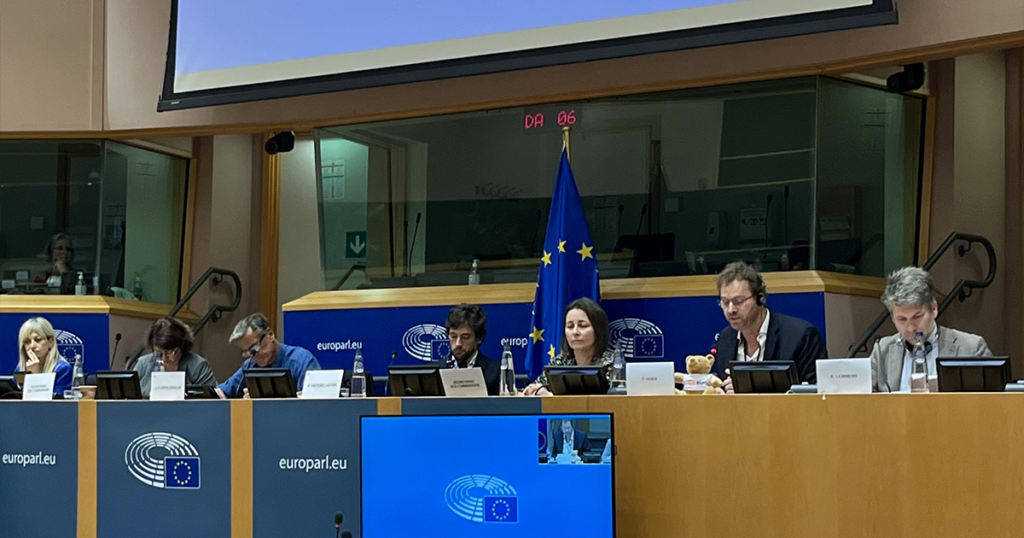In the heart of the European Parliament, a significant dialogue unfolded within the Committee on Civil Liberties, Justice, and Home Affairs (LIBE) and Legal Affairs (JURI) Committee, led by the stakeholders committed to enhancing child protection across the European Union. This crucial meeting, enriched by the expertise and dedication of Ms. Ewa Kopacz, Vice-President of the European Parliament, EP Coordinator for Children’s Rights, underscored the collective determination to safeguard Europe’s missing children. Ms. Kopacz’s leadership and the collaborative efforts of the LIBE & JURI Committees, integral to shaping justice and home affairs legislation in the European Union, set a precedent for transformative action.
A Call to Action from AMBER Alert Europe
In this pivotal setting, Frank Hoen, Chairman of AMBER Alert Europe, emphasized the profound disparity of tools in missing children cases within the European Union, particularly when a case is not deemed in the context of the criminal investigation. “In many EU countries, investigators only receive full access to all investigative tools if the missing child case is related to crime. However, the vast majority of missing children cases are not related to crime. Yet, these children may be equally at serious risk and the law enforcement authorities in dire need of access to all effective tools,” Hoen stated, drawing attention to a significant oversight in the current system.

The Right to Life: A Fundamental Perspective
Drawing from the emergency room analogy, Hoen further illustrated the point: “Imagine a child brought into the hospital emergency room after a car accident. If the life of the child is triaged as ‘being at high risk,’ the child immediately receives full medical attention. And medical staff has access to the full range of diagnostic tools and treatments, irrespective of the cause of the car accident. So, save lives first, then investigate the cause.” This approach, Hoen argued, should be mirrored in the search for missing children—where the child’s safety is paramount, regardless of whether their disappearance is crime-related.
Professor Koen Lemmens of Katholieke Universiteit Leuven, a Brussels-based attorney with an extensive background in European Human Rights Law, supported this view by underscoring the fundamental right to life as protected under Article 2 of the European Convention on Human Rights (ECHR). Lemmens’ analysis affirms that proactive measures, akin to a ‘Risk Triage System’, align with the obligations of states under Article 2 ECHR to protect the lives of children within their jurisdiction, emphasizing the non-conditional nature of this fundamental right.
Mutual Recognition and European Collaboration
This discussion within the LIBE & JURI Committees marks a significant step forward in the collective effort to ensure no child’s disappearance is treated with anything less than utmost urgency and dedication. “Our commitment to the safety of our children should be unwavering and unconditional. It is imperative that we adopt and implement a system that reflects this commitment, prioritizing the protection of every child as a fundamental right,” Hoen concluded, advocating for a system that transcends the limitations posed by the current discrepancy between crime-related and non-crime-related cases.
The importance of mutual recognition of risk assessments across member states was discussed as a pivotal mechanism for ensuring swift and unified action, drawing inspiration from the operational model of the European Arrest Warrant. This principle could ensure that once a child’s risk level is assessed in one EU Member State, it is acknowledged and on a case-by-case basis, can be acted upon across all EU Member States.
Supporting the Establishment of a European Centre for Missing Persons, Missing Children
Furthermore, AMBER Alert Europe strongly supports the establishment of a European Centre for Missing Persons, Missing Children. This centre could play a crucial role in studying the missing children phenomenon and streamlining the response across the Union. Alternatively, integrating this function into an existing EU agency could also significantly enhance the EU’s capability to protect missing children more efficiently.
For more information on the discussions held during the LIBE & JURI Committees meeting, please visit the European Parliament webpage.
